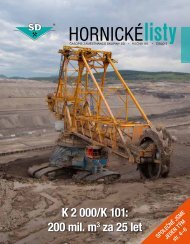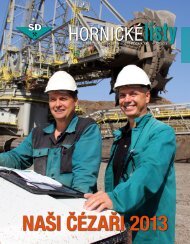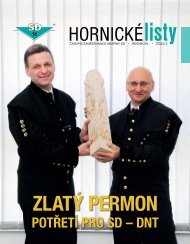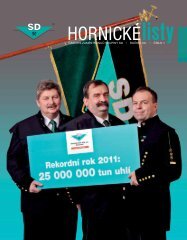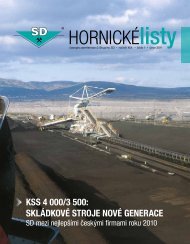annual report 2004 - Severočeské doly a.s.
annual report 2004 - Severočeské doly a.s.
annual report 2004 - Severočeské doly a.s.
Create successful ePaper yourself
Turn your PDF publications into a flip-book with our unique Google optimized e-Paper software.
16<br />
——<br />
17<br />
Executive Management<br />
The company has a Chief Executive Officer, who is also the Chairman of the Board of Directors. The Chief<br />
Executive Officer is appointed and recalled by the Board of Directors. The Chief Executive Officer is<br />
responsible for the business management of the company and for the implementation of decisions<br />
made by the Board of Directors, the General Meeting, or the Supervisory Board. The Chief Executive<br />
Officer has a CEO Council, which is his advisory body and is composed of members of the company’s<br />
executive management and the director of the Chief Executive Officer’s Office. The status<br />
of the Council and its tasks are regulated in its Statutes.<br />
Members of the executive management are also appointed and recalled by the Board of Directors,<br />
based on a proposal from the Chief Executive Officer.<br />
The Board of Directors acts in the name of the company. The Board of Directors is represented in external<br />
relations either by the Chairman of the Board of Directors alone or by one of the Vice-Chairmen together<br />
with one member of the Board of Directors. The Company Proxy, authorized to carry out all legal actions<br />
except property conveyancing and mortgaging, may also act in the name of the company.<br />
The company’s employees also carry out legal transactions on behalf of the company based on authorization<br />
awarded in accordance with the company’s internal regulations and signing rules.<br />
Relations between the Company and Shareholders<br />
The company respects all the provisions of the Commercial Code concerning the protection of shareholder<br />
rights, and in particular provides all relevant information about the company promptly and<br />
convenes General Meetings as required. In addition, the company ensures that all shareholders are<br />
treated equally.<br />
Shareholder Rights<br />
No special rights are attached to the ownership of company shares. The basic rights of shareholders,<br />
the way these rights are exercised, and transferability are regulated by Act No 513/1991,<br />
the Commercial Code, and the Articles of Association. Where rights are not exercised, the resultant<br />
procedure is laid down in the Articles of Association in accordance with generally binding legal<br />
regulations in force in the Czech Republic.<br />
Rights attaching to shares are exercised by the person listed in the statutory records at the Prague<br />
Securities Centre, unless the law specifies to the contrary.<br />
1. Shareholders have one vote per CZK 1,000 of nominal value. If one share is owned by several<br />
persons the co-shareholders are obliged to agree on which of them shall exercise the rights attaching<br />
to the share or to appoint a joint representative.<br />
2. A shareholder has the right, subject to the conditions laid down in Section 178 of the Commercial Code,<br />
to a share in the company’s profits (i.e. a dividend) as approved for distribution by the General Meeting.<br />
a) This share is determined by the ratio of the nominal value of a shareholder’s shares to the<br />
nominal value of the shares of all shareholders.<br />
b) The dividend is payable within three months of the date the General Meeting resolution<br />
on the distribution of profits is adopted. The time limit for the payment of a dividend relates<br />
both to holders of bearer shares and holders of registered shares. The General Meeting shall<br />
decide, pursuant to a proposal from the Board of Directors, on the dividend payment date, place,<br />
method of payment, and decisive day for the payment of the dividend.<br />
c) The right to the payment of a dividend is time-barred once four years have elapsed as of the<br />
decisive date for the dividend payment.<br />
d) A shareholder is not obliged to return a dividend to the company which is received in good faith.<br />
3. Over the life of the company, and subsequent to the winding-up of the company, a shareholder is<br />
not entitled to demand the return of his contributions. Only the considerations allowed under<br />
the law shall not be deemed to be the return of contributions. If the company is wound up with<br />
liquidation, a shareholder has the right to a share in the liquidation balance.<br />
4. A shareholder has the right to participate in the management of the company, i.e. to attend the General<br />
Meeting and cast votes, demand and receive explanations relating to the company where such





